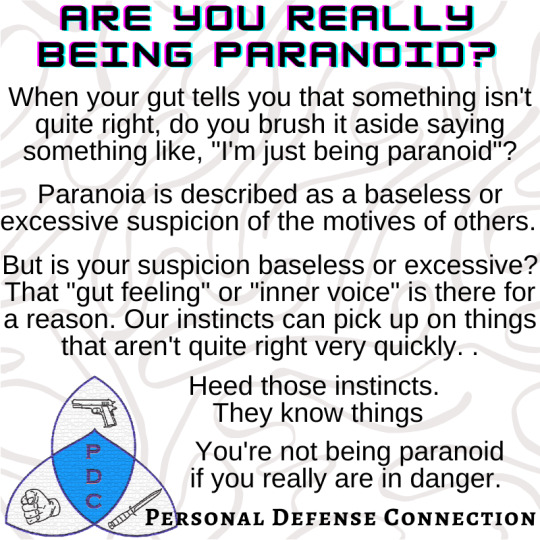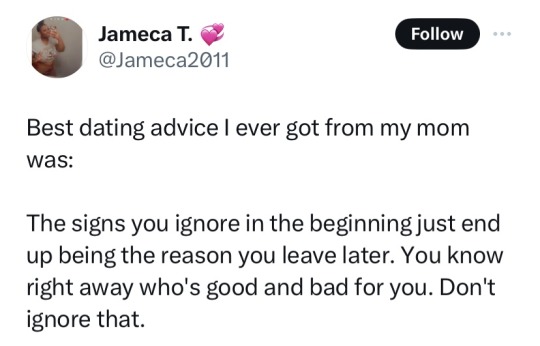#listen to your gut
Text
Don’t let anyone make you feel crazy because you figured them out.
1K notes
·
View notes
Text

I usually know if something is off… the gut doesn’t usually lie!!! I have said it for days something is off…eventually I figure it out
50 notes
·
View notes
Text

You're not being paranoid. You're listening to your instincts.
50 notes
·
View notes
Text

That moment when you first meet someone and something just doesn’t sit right with you and you decide to dismiss it, that’s the biggest disservice you can do to yourself. It always comes back to bite you in your rear.
.
.
#listen to your gut#feeling#soulinkpoetry#poetry#thoughts#feelings#she writes#poets on tumblr#poets corner#writers and poets#life quotes
35 notes
·
View notes
Text

#brownsugar4hersoul#soul candy#eye candy#sugar for the soul#judith mcnaught#instincts#gut feelings#follow your gut#gut feeling#intuition#listen to your intuition#listen to your gut#follow it#ignore logic#ignore the odds#ignore complications#just go for it#go for it#remember this#always remember#don't forget#mark my words#keep in mind#best advice#life advice#wise words#words of wisdom#word from the wise#remind yourself#reminders
4 notes
·
View notes
Text
i love when my brain tells me not to do something and i ignore it and do exactly what it said i would. let me paint you a picture:
me: **sets coffee down on an old sketchbook from college**
my brain: "should you really set that on a sketchbook with art on it that you cant get back? what if you spill?"
me: **ignores and then proceedes to spill coffee on said art**
my brain:

#listen to your gut#walking disaster#absolute mess#cannot fucking stand when this happens#its the worst kind of “i told you so” because im the one who told me! ugh
3 notes
·
View notes
Text
Predators have a pattern
The Gift of Fear: Survival Signals That Protect Us from Violence was written by Gavin de Becker to help people trust their gut instinct and avoid potentially dangerous situations, by learning to recognize various behaviours/events that serve as common precursors to violence. These are called PINS - Pre-Incident Indicators.
By recognising warning signs such as PINS, individuals can better identify dangerous people before something bad happens and take the necessary precautions/actions to stay safe.
There are several types of PINs to watch out for, namely:
Forced Teaming
This is when a person implies that they have something in common with their chosen victim, acting as if they have a shared predicament when that isn't really true. Speaking in "we" terms is a mark of this, i.e. "We don't need to talk outside... Let's go in." The goal is to establish a false sense of rapport and make their victim lower their guard.
If someone keeps using collective terms like "we" and "us", implying you are a "team" when you don't know them well/have just met, ask yourself:
Why is it so important to this person that I feel obliged to do something together with them right now, when what I was doing originally didn't involve them (ie, bringing shopping upstairs to my apartment)
How much do I actually know about this person and their intentions for choosing to attach themselves to me in this situation? (ie, are they hoping to get me alone?)
Charm and Niceness
This is being polite and friendly to a chosen victim in order to manipulate him or her by disarming their mistrust.
If someone you don't know well/just met is being charming and nice to you, especially if they are combining this with the Forced Teaming tactic, ask yourself:
Why are they so keen to quickly establish a rapport with me and make me like them?
Are they looking for me to do something for them (ie go somewhere with them, let them into an apartment building they "forgot" their key to, lend them my phone to "make a phone call", give them personal information about myself that could allow them to find out where I live/work later, give them money) now that I am "on the hook" AKA engaged in a friendly conversation with them?
How do I think they would react to me politely trying to disengage/declining to do whatever they've asked of me?
Charm and niceness in predators is superficial; they don't tend to keep up the act once they are told no, and they tend to challenge your boundaries instead of respecting them.
Too many details
If a person is lying, they will add excessive details to make themselves sound more credible to their chosen victim.
A person who's genuinely locked themselves out of their apartment building by accident will most likely just say, "Hey, I just nipped out for something and I forgot my key like an idiot, could you let me into the building please?"
Someone who's focused on selling their lie, however, would probably weave a whole cover story to explain away their actions, like, "Hi, I just moved in here and I was running out to grab some meds for my sick partner but I left my key in my jacket upstairs - I normally always wear that jacket, but now of course it's really warm, so I didn’t grab it, and I guess this is a lesson in not keeping my keys in my jacket pocket, haha. Could you let me in? I don’t wanna have to call my partner to come all the way down to buzz me in, because she's not supposed to be exerting herself while she recovers, so help me out here?"
Ask yourself:
Why did they tell me so much information I didn’t ask for and didn't need to know?
Did the person's behaviour seem suspicious to me before they provided this very detailed cover story?
Why would a credible person feel the need to justify their actions to me and overcompensate to convince me of their credibility before I've even called it into question?
Typecasting
An insult is used to get a chosen victim who would otherwise ignore one to engage in conversation to counteract the insult. For example: "Oh, I bet you're too stuck-up to talk to a guy like me."
The tendency is for the chosen victim to want to prove the insult untrue.
Ask yourself:
Are they insulting me now just because I wouldn't do what they wanted?
Does proving their negative assertion wrong involve me doing what they wanted, in spìte of my own discomfort and gut instinct that told me not to do it in the first place?
Why should I care about this person's opinion of me?
Loan Sharking
Giving unsolicited help to the chosen victim and anticipating they'll feel obliged to extend some reciprocal openness in return.
Ask yourself:
Why is this person offering to help me right now?
Did I actually want or need their help, or have they just swooped in without being asked?
Does accepting their help feel like it comes at a price, or am I going to feel indebted to them for this?
The Unsolicited Promise
A promise to do (or not do) something when no such promise is asked for; this usually means that such a promise will be broken.
The unsolicited promise is a predator's subconscious projection. Ironically, in their effort to lull you into a false sense of security and make you believe that a specific bad thing won't happen to you, they are giving themselves away - because the fact that such a thing has occurred to them before you ever raised concerns about it, indicates that it was on their mind and likely their intention all along.
For example: an unsolicited, "I promise I'll leave you alone after this," usually means you will not be left alone afterwards.
Similarly, an unsolicited "I promise I won't hurt you" usually means the person intends to hurt you.
Ask yourself:
Why did that person feel the need to promise something I never asked about?
Discounting the Word "No"
Any reasonable, respectful person will back off when you tell them no. They might go away thinking you are rude and strange if they don't understand why you're setting a boundary, but they will back off. A predator will not accept rejection.
A predator will push your boundary, test how serious you are, and try to coerce you into changing your answer even after you have given them multiple clear rejections. They may try to charm you, or turn the subject into a debate where they can wear down your resolve. They may turn angry and threatening. They may try to guilt trip you, or use typecasting to make you want to prove them wrong. They may even cycle through more than one of these tactics - whatever they think will work.
Any person who is unwilling to respect boundaries and refuses to take no for an answer, regardless of the situation, is not a safe person for you to be around.
#gift of fear#gavin de becker#not rp memes#but still important information for recognising predators in the rp community (and in everyday life)#(also can be used as a resource for writing predatory/villainous characters i guess if you like to research how they operate/think)#¯\ _(ツ)_/¯#stay safe out there lovelies#listen to your gut
1 note
·
View note
Text
Asking yourself “would someone who loves and care about me do that to me” and being very honest with yourself will save you from going back into the wrong hands.
#text post#my thoughts#know your worth#protect your heart#listen to your gut#be honest with yourself
736 notes
·
View notes
Text
Next time, I’m following my instincts. Im no convincing myself.
3 notes
·
View notes
Text

Straight up fact
23 notes
·
View notes
Text

Pay attention to your intuition.
7 notes
·
View notes
Text
That 19 year old kid was terrified and didn't even want to go?! He just went to please his dad for Father's Day?!?
#play stupid games win stupid prizes#got me fucked up#that doesnt sound healthy#titan submersible#lost submersible#tragedy#listen to your gut
2 notes
·
View notes
Text
Sooo…like…lesson learned. I’m ready for positive vibes now.
2 notes
·
View notes
Text
one common shifting misconception that i’m seeing a lot is that you need a method, but you really don’t. methods are helpful in that they give you a way to set your intentions for shifting and can provide some structure to make you feel more comfortable, but that doesn’t mean if you don’t use one you won’t shift.
i have adhd, and at the beginning of my shifting journey, i was hellbent on following these methods down to every last detail. all that did was make it worse; i spent too much time worrying about how i couldn’t focus enough to follow the method, instead of working towards shifting.
now i just meditate until i reach the void state, letting thoughts go in and out, and then i say some affirmations (which you don’t need either, they’re just helpful for me) and think about my dr for a bit.
remember, shifting journeys are not a uniform experience. people have their own preferences and know what works best for them. listen to yourself and grow from the setbacks!
3 notes
·
View notes
Photo

7 notes
·
View notes
